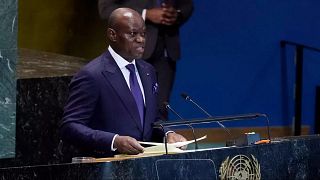Gabon
There's a new air of optimism among the seniors waiting patiently since dawn in Gabon's capital Libreville to chase up pensions that were never paid.
Some say they've received nothing for years.
The general who ousted President Ali Bongo Ondimba in a coup on August 30 and is now transitional leader of the oil-rich, central African state has vowed to overhaul the pension system.
Just days after taking the helm, General Brice Oligui Nguema unveiled plans to reform the dysfunctional system, which has long doomed many to poverty.
Leonie Oumtoma, a widow and grandmother, has lost count of the times she has queued at Batavia social security office, trying to find out when she will start receiving some money.
"I lost my husband in 2017. I submitted my documents in 2018, but I've since received nothing.
"Every time, I leave, I come back...," she says. "I don't even know how much I'm going to get."
'End the suffering'
The ousting of Bongo, 64, came moments after he was proclaimed winner in a presidential election -- a result branded a fraud by the opposition and the military coup leaders, who have also accused his regime of widespread corruption and bad governance.
In a speech before hundreds of business leaders two days later, Oligui pledged to "end the suffering" of pensioners and the ill.
He announced that the private sector would "immediately" take over the management of state pension and health funds.
"I'm a widow but I haven't received a penny of my husband's pension for two years," grumbles 57-year-old trader Henriette Nset.
There are thousands like her, say the opposition and civil society groups, who for years have raised the alarm.
One in three lives below the poverty line in Africa's third-richest country in terms of per-capita GDP, according to the World Bank.
Gabon's wealth from its abundant oil reserves and other natural resources is in the hands of a small elite.
Many saw the coup as an act of liberation from 55 years of Bongo family rule -- 14 years under Ali Bongo, who took over when his father Omar died in 2009 after nearly 42 years in power.
'Wants results'
Life expectancy in Gabon was 66 years old in 2021, according to World Bank figures.
"I'm forced to dip into my savings to meet the needs of my family," says Francois Moussavou, 58, who has been waiting for his pension for two years.
Despite Oligui's promises, the initially upbeat mood soon evaporates at Batavia social security office.
A "technical problem" forces it to close mid-morning.
Romaric Ngomo Menie, inspector general of the National Social Security Fund, says he is aware of the suffering and the president "wants results quickly because he cares about social protection".
Like others, retired technician Aristide Mouanda, 57, who stopped working a year ago but has not received any pension payments, hopes for change under the new regime.
Oligui has promised to hand the country back to civilian rule with elections after a transitional period but has not set a date.
He has also set up a broad transitional government, met key figures and promised to help the country's poorest.
But strikes by workers who complain they have not been paid for months already suggest the patience of the Gabonese may quickly run out.













01:15
UN court backs Equatorial Guinea in disputed islands case with Gabon
Go to video
Gabon: former president Ali Bongo and family go into exile in Angola
01:15
Gabon’s constitutional court confirms Nguema’s landslide presidential victory
Go to video
Oligui Nguema: A breakthrough or continuity for Gabon? [Business Africa]
00:57
Gabon: Oligui Nguema clinches a landslide win
Go to video
Brice Oligui Nguema wins Gabon Presidential election with 90.35% of the Vote